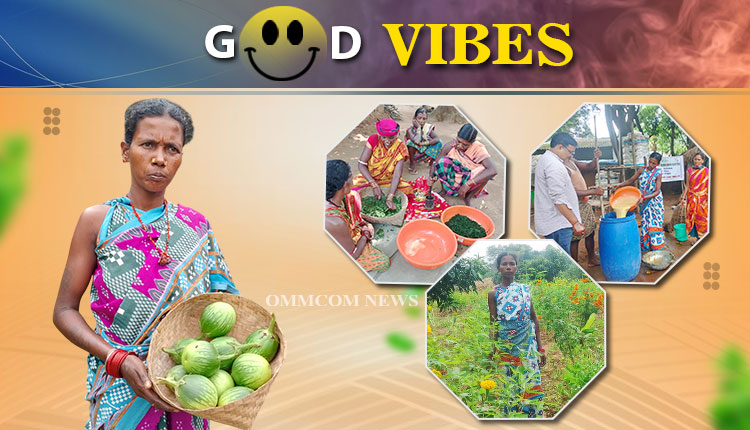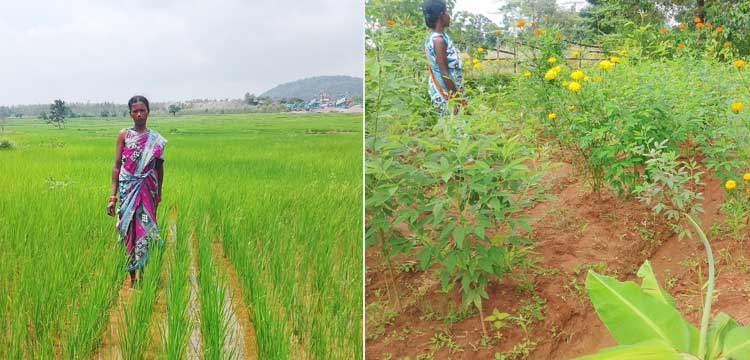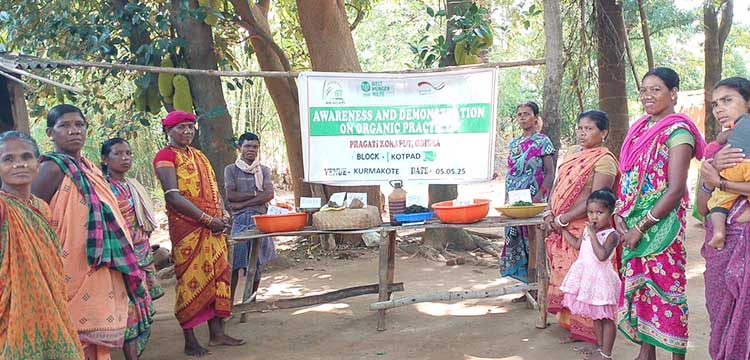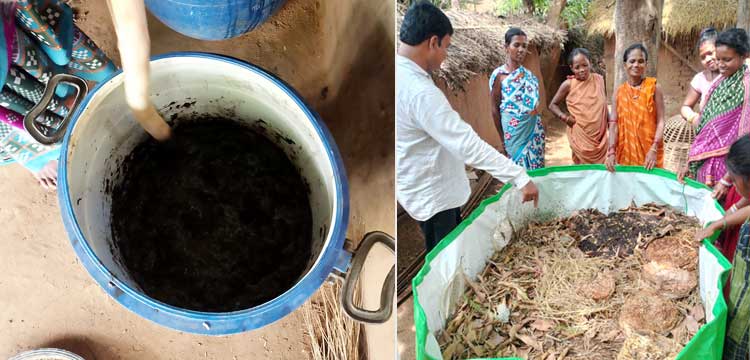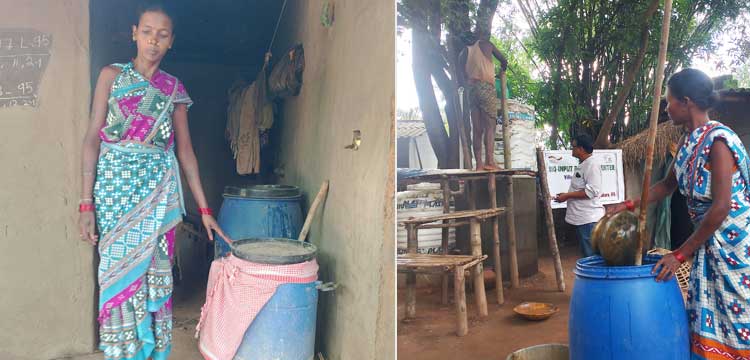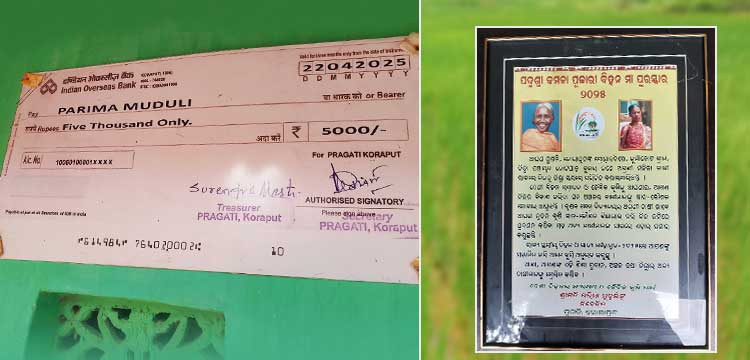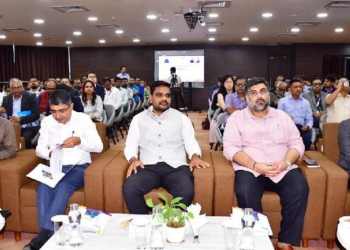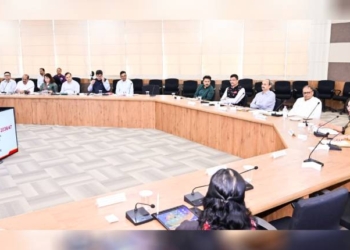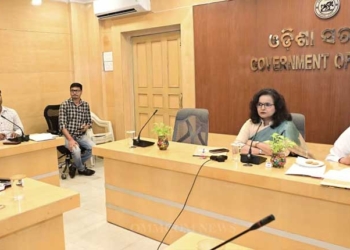When we think of farmers, the image of men tilling the soil or sowing seeds often comes to mind. However, behind the scenes, women have been playing a crucial role in agriculture, contributing significantly to the sector’s growth and development. In developing countries like India, agriculture continues to absorb and employ a substantial female workforce, yet women farmers remain largely invisible, denied recognition and rights.
As India observes Rashtriya Mahila Kisan Diwas, or National Women Farmers’ Day, today, Ommcom News shines the spotlight on Parima Muduli, a trailblazing woman farmer from Koraput.
With a passion for nurturing the land, she has transformed her three-acre farm into a thriving model of sustainable agriculture. Parima, a Paraja tribal woman, has transformed her land into a living model of regenerative farming. That’s not all. Through her expertise, she offers training to local farmers on organic fertilizers and innovative techniques to grow a variety of pulses and vegetables without pesticides.
With training from PRAGATI, a local non-profit organization, and technical guidance from Watershed Support Services and Activities Network (WASSAN) experts, she combined traditional knowledge with modern techniques to create a resilient and biodiverse farm ecosystem.
As a master trainer of the Khadia Thakura Farmer Field School, Parima provides training to over 30 farmers in Kurmakote village, empowering them to adopt eco-friendly practices. Her farm serves as a vibrant training ground, where she regularly conducts sessions, mentoring dozens of farmers – especially women – on ecological techniques and self-reliant farming.
Parima’s commitment to organic farming not only enhances soil fertility but also provides a steady income, enabling her to support her family.
Talking about her journey, Parima said, “I live by the mantra, ‘Soil is the very basis of life. This conviction led me to reject costly, detrimental chemical fertilizers and pesticides. Instead, I’ve become an expert in bio-inputs, concocting my own potent, organic soil treatments right on-site.”
Talking about her organic farming practices, Parima said “My farm is equipped with a sophisticated Bio-Resource Centre (BRC) that enables me to produce up to 500 liters of specialized organic mixtures. I prepare traditional recipes like Bijamruta for seed treatment, which protects seeds and seedlings from pathogens. I also make Jimamruta and Ghanajibamruta using cow dung, cow urine, jaggery, and pulses, which act as microbial enhancers, boosting soil biology and nutrient availability. Additionally, I use natural pest repellents like Neemastra and Handikhata, derived from local botanicals like neem and arakha (Giant Milkweed). These organic solutions allow me to manage pests and fertilize my crops without relying on synthetic chemicals.”
Parima has made significant contributions to seed conservation, successfully preserving and promoting over 12 native vegetable varieties. Her dedication to preserving traditional crops has ensured the continuation of unique varieties like Anca Lau (bottle gourd) and Choto Kumda (small pumpkin), enriching local biodiversity and food security.
Parima’s achievement list is unending.
Parima’s innovative approach to farming has yielded impressive results. Her diversified cultivation of high-value crops like brinjal, maize, cowpea, and leafy greens generated a substantial income from market sales. By leveraging her integrated farming system, Parima has created a robust financial cushion, shielding herself from the uncertainties of seasonal grain crops.
Moreover, Parima’s native chicken rearing venture has emerged as a profitable and sustainable component of her farm. With a flock of around 50 birds, she enjoys a triple benefit: a steady protein supply, natural pest control, and enriched soil. The sale of surplus eggs and chickens earns her a decent income. This integrated approach has not only bolstered Parima’s financial stability but also exemplifies the potential of eco-friendly farming practices.
Apart from men, Parima trains women farmers in her locality to build climate-resilient, self-sustaining ecosystems, promoting knowledge sharing and economic prosperity. On women’s roles in farming, she says, “Women are equally capable as men in any field – be it agriculture, household chores, or office work. All they need is the willingness to showcase their potential and create their own identity.”
Before signing off, Parima attributed her success to PRAGATI, a local non-profit in Koraput district that has been championing sustainable agriculture and empowering rural communities.
Through PRAGATI’s initiatives, Parima learned about climate-resilient practices, soil conservation, and crop management. She also benefited from the organization’s Farmer Producer Groups, which enabled her to connect with other farmers and share best practices. Today, Parima is not only a successful farmer but also a dedicated trainer, providing free training to fellow farmers in her area.
“With PRAGATI’s support, I gained valuable knowledge and skills in organic farming, which I now use to train other farmers in my community”, she said.
By Rashmi Rekha Das




